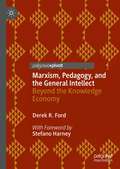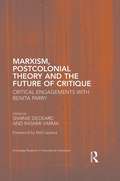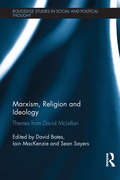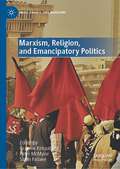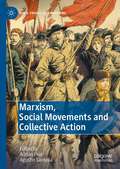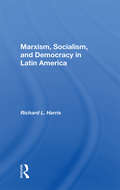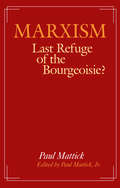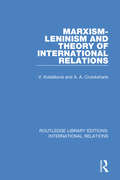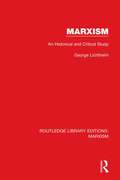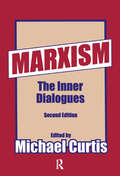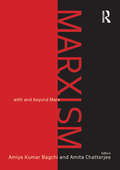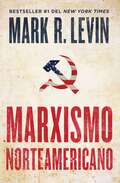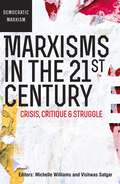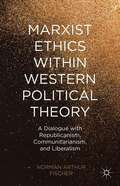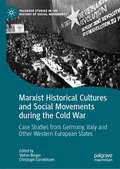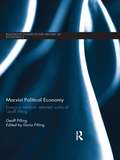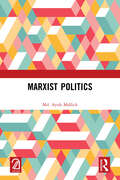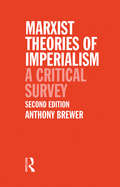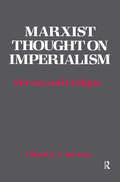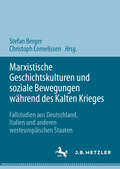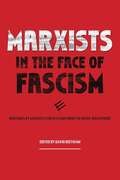- Table View
- List View
Marxism, Pedagogy, and the General Intellect: Beyond the Knowledge Economy
by Derek R. FordThis book is the first to articulate and challenge the consensus on the right and left that knowledge is the key to any problem, demonstrating how the left’s embrace of knowledge productivity keeps it trapped within capital’s circuits. As the knowledge economy has forced questions of education to the forefront, the book engages pedagogy as an underlying yet neglected motor of capitalism and its forms of oppression. Most importantly, it assembles new pedagogical resources for responding to the range of injustices that permeate our world. Building on yet critiquing the Marxist notion of the general intellect, Derek R. Ford theorizes stupidity as a necessary alternative pedagogical logic, an anti-value that is infinitely mute and unproductive.
Marxism, Postcolonial Theory, and the Future of Critique: Critical Engagements with Benita Parry (Routledge Research in Postcolonial Literatures)
by Sharae Deckard Rashmi VarmaUsing the aesthetic and political concerns of Parry’s oeuvre as a touchstone, this book explores new directions for postcolonial studies, Marxist literary criticism, and world literature in the contemporary moment, seeking to re-imagine the field, and alongside it, new possibilities for left critique. It is the first volume of essays focusing on the field-defining intellectual legacy of the literary scholar Benita Parry. As a leading critic of the post-structuralist turn within postcolonial studies, Parry has not only brought Marxism and postcolonial theory into a productive, albeit tense, dialogue, but has reinvigorated the field by bringing critical questions of resistance and struggle to bear on aesthetic forms. The book’s aim is two-fold: first, to evaluate Parry’s formative influence within postcolonial studies and its interface with Marxist literary criticism, and second, to explore new terrains of scholarship opened up by Parry’s work. It provides a critical overview of Parry’s key interventions, such as her contributions to colonial discourse theory; her debate with Spivak on subaltern consciousness and representation; her critique of post-apartheid reconciliation and neoliberalism in South Africa; her materialist critique of writers such as Kipling, Conrad, and Salih; her work on liberation theory, resistance, and radical agency; as well as more recent work on the aesthetics of "peripheral modernity." The volume contains cutting-edge work on peripheral aesthetics, the world-literary system, critiques of global capitalism and capitalist modernity, and the resurgence of Marxism, communism, and liberation theory by a range of established and new scholars who represent a dissident and new school of thought within postcolonial studies more generally. It concludes with the first-ever detailed interview with Benita Parry about her activism, political commitments, and her life and work as a scholar.
Marxism, Religion and Ideology: Themes from David McLellan (Routledge Studies in Social and Political Thought)
by David Bates, Iain MacKenzie and Sean SayersAs austerity measures are put into place the world over and global restructuring is acknowledged by all as an attempt to bolster the economic system that lead to the crash, there is a great need to come to grips with the economic, political and philosophical legacy of Marx. Of particular interest are Marx’s analyses of alienation and the cycles of boom and bust thought to be integral to the functioning of capitalism. Moreover, as the Cold War drifts into the history books, it is possible to reconsider the lasting impact of Marx’s analyses without the shadows cast by the Soviet version of communism. Equally, though, scholars are increasingly turning to Marx for insight into the rise of religion and the corresponding demise of political ideologies that seems to mark the contemporary age. Are we witnessing ‘the return of Marx’? Few scholars have done as much to tease out the intricacies of Marx, ideology and religion and their overlapping concerns as the eminent writer and Marx biographer, Professor David McLellan. This book brings together a group of internationally renowned academics to reflect upon, develop and criticise McLellan’s analyses of these three themes with a view to contributing more broadly to scholarly debates in these fields. This exciting and timely analysis will be of interest to scholars of political theory, the history of political thought (including historical methodology), Marx and Marxism, sociology of knowledge (particularly in relation to discussions of ideology), religion and theology more widely.
Marxism, Religion, and Emancipatory Politics (Marx, Engels, and Marxisms)
by Graeme Kirkpatrick Simin Fadaee Peter McMylorThis edited collection evaluates the relationship between Marxism and religion in two ways: Marxism’s treatment of religion and the religious aspects of Marxism. Its aim is to complicate the superficial understanding of Marxism as a simple rejection of religion both in theory and practice. Divided into two parts (Theory and Praxis), this book brings together the three different themes of Marxism, religion, and emancipation for the first time. The first part explores the more theoretical discussions regarding the relationship between Marxism and various themes (or currents) within religious thought, to highlight points of compatibility as well as incompatibilities/conflicts. The studies in the second part of the collection refer to how Marxist ideas are received in different parts of the world. They show that as soon as Marxism arrives in a new place, the theory interacts and bonds with a pre-existing stock of ideas, each changing the other reciprocally.
Marxism, Social Movements and Collective Action (Marx, Engels, and Marxisms)
by Adrián Piva Agustín SantellaThis book makes a relevant contribution to a Marxist critical explanation of social conflicts, social movements and protests. There is abundant literature on social conflict and social movements from Marxist perspectives. However, rigorous criticism, both theoretical and methodological, is scarce. The objective of this volume is the collection of works developing a critical reflection on the categories of theories about contentious collective action and social movements from a Marxist perspective. In order to better understand these phenomena and go beyond their mere case description, the theory needs to be improved. To that end, the book also promotes the debate between Marxisms and the collective action and new social movements in a renewed way. Here different Marxist arguments consider not only their methodological and ideological bias, but also the specific conceptual contributions of those theories.
Marxism, Socialism, And Democracy In Latin America
by Richard L. HarrisAt a time when the validity of Marxism is being questioned because of the collapse of the Communist regimes in Eastern Europe, Richard Harris examines the relevance of Marxism and socialism for Latin America and the Caribbean. Dr. Harris discusses recent revolutionary regimes and attempts at socialist transformation in the region in terms of Marxist theory, comparing them with the historical experiences of the Soviet Union, China, Yugoslavia, and Vietnam. The author argues that Marxist theory offers a framework for understanding recent revolutionary transformations as well as the contradictions and limitations of existing democratic regimes in the region. Particular attention is given to revolutionary Cuba, the Allende administration in Chile, the Popular Revolutionary Government in Grenada, the Sandinista regime in Nicaragua, and contemporary leftist parties and movements throughout Latin America. He contends that democratization and the solution of the region's economic and social problems require a democratic socialist project.
Marxism--Last Refuge of the Bourgeoisie?: Last Refuge Of The Bourgeoisie?
by Paul Mattick, Jr.Drawing upon released documents, memoirs and party-history works, the process and impact of the political campaigns in China between 1950 and 1965 is documented. Complete with extensive interviews with Chinese scholars and former officials, the book reviews the findings of the first edition.
Marxism-Leninism and the Theory of International Relations (Routledge Library Editions: International Relations #4)
by V. Kubalkova A. CruickshankRefuting the assumption that orthodox Marxist theory contains anything of relevance on international relations, this book, originally published in 1980, clarifies, reconstructs, and summarizes the theories of international relations of Marx and Engels, Lenin, Stalin and the Soviet leadership of the 1970s. These are subjected to a comparative analysis and their relative integrity is examined both against one another and against selected Western theories. Marxist-Leninist models of international relations are fully explored, enabling the reader to appreciate the essence and evolution of fundamental Soviet concepts as such as proletarian, socialist internationalism, peaceful co-existence, national liberation movement and détente.
Marxism: An Historical and Critical Study (Routledge Library Editions: Marxism #13)
by George LichtheimThis book, first published in 1961 and revised in 1964, is both a critical study of a body of thought and an historical account of how Marxist theory arose from the context of European history in the 19th century. It traces the development of socialist thought from the French to the Russian Revolutions and attempts to show in what manner the political and intellectual problems of Central Europe between 1848 and 1948 came to dominate the theory and practice of that Marxist movement which formed the crucial link between the two revolutions. The author takes the view that Marxism is a movement and a body of doctrine which belongs essentially to the 19th century, which came to an end with the First World War and the Russian Revolution, and that its impact as a doctrine has now been absorbed.
Marxism: For and Against
by Robert L. Heilbroner"Genuinely open-minded and inquiring. . . .it intelligently summarizes and shrewdly questions four central topics of Marxist thought--the dialectical approach to philosophy, the materialist interpretation of history, the socio-analysis of capitalism and the commitment to socialism." --Raymond Williams, Cambridge University In the lucid style and engaging manner that have become his trademark, Robert L. Heilbroner explains and explores the central elements of Marxist thought: the meaning of a "dialectical" philosophy, the usefulness and problems of a " materialist" interpretation" of history, the power of Marx's "socioanalytic" penetration of capitalism, and the hopes and disconcerting problems involved in a commitment to socialism. Scholarly without being academic, searching without assuming a prior knowledge of the subject, Dr. Heilbroner enables us to appreciate the greatness of Mark while avoiding an uncritical stance toward his work.
Marxism: Is it Science? (Routledge Revivals)
by Max EastmanFirst published in 1941, Marxism: Is it Science? was written to present the author’s criticisms of Marxism and, in doing so, to further exemplify his ‘Method of Instruction’ first proposed in an earlier work. The book is divided into six parts to provide six complete presentations of Marxism and why the author considers it unscientific. The six different approaches, varying in focus and complexity, work together to give the reader a detailed overview of Marxism and the authors critique of it.
Marxism: The Inner Dialogues
by Catherine ParadeiseThis volume, which initially appeared in 1970, constitutes a major set of statements by leading social scientists, historians, and philosophers to explain the continuing impact of Marxism 150 years after its emergence. The second edition is graced with a stunning new 50 page essay by the editor on the Asiatic mode of production-what has been called the Achilles heel of Marxism by some and its limiting case by others., Marxism: The Inner Dialogues covers a wide range of basic issues and problems arising from what has been said for, against, and about Marxism. This is a rich and systematic collection of writing by the foremost authorities on the subject in the world. The book provides the most inclusive and lasting analysis of Marxist thought available. Professor Curtis has confronted current problems in Marxist studies in the context of the classic concerns of western thought., In addition to new material, the book includes discussions of the meaning fulness of Marxist theory, Marxist doctrine as ideology, the unity or lack thereof in Marxism, claims to the true inheritance of Marx, alienation in Marxist thought, the ethical bases of Marxism, the sociological worth of Marxist analysis, the validity of the dialectic, the materialist conception of history, Marxism and economic analysis, political theory and the proletariat, socialism and state power, and Marxist doctrine and modernization., Marxism: The Inner Dialogues, with contributions from major figures such as George Lichtheim, Lewis Coser, T.B. Bottomore, Daniel Bell, Alasdair Maclntyre, Oskar Lange, Ralf Dahrendorf, Seymour Martin Lipset, and Robert Tucker, among others, provides a highly useful compendium that can be extremely valuable in courses in general political theory and the theories driving modern social movements.
Marxism: With and Beyond Marx
by Amita Chatterjee Amiya Kumar BagchiThis book offers a unique re-conceptualization of Marxism in bringing together leading scholars across disciplines — history, philosophy, economics, politics, sociology, and literary and culture studies — into one comprehensive corpus. It demonstrates the engaging relevance of the perspectives and techniques of the analyses adopted by Karl Marx, Frederich Engels and contemporary Marxists, and will be immensely useful to scholars and researchers across social sciences as well as general readers interested in Marxism.
Marxismo norteamericano (American Marxism Spanish Edition)
by Mark R. LevinBESTSELLER #1 DEL NEW YORK TIMES Mark R. Levin, autor seis veces bestseller #1 del New York Times, estrella de Fox News y presentador de radio, regresa para explicar cómo aquellos peligros sobre los que nos advirtió hace una década finalmente han ocurrido…y lo que se debe hacer ahora para hacerlos retroceder.Mark R. Levin movilizó a los conservadores en 2009 con Libertad y tiranía, el cual brindó un marco filosófico, histórico y práctico para detener el ataque liberal contra los valores basados en la Constitución, que hizo su aparición durante los años de Obama. Ese libro hablaba de que estábamos parados frente al precipicio del ataque del progresismo a nuestras libertades, desde la economía hasta la atención médica, y desde el calentamiento global hasta la inmigración. Ahora, más de una década después, hemos ido más allá de ese precipicio…y estamos pagando el precio. En Marxismo norteamericano, Levin explica cómo hoy en día los elementos centrales de la ideología marxista se han generalizado en la sociedad y la cultura estadounidenses—desde nuestras instituciones educativas, la prensa y las corporaciones hasta Hollywood, el partido Demócrata y la presidencia de Biden—y cómo a menudo se la disfraza con rótulos engañosos como &“progresismo,&” &“socialismo democrático,&” &“activismo social,&” y &“activismo comunitario&”. Con su característico análisis incisivo, Levin se sumerge en la psicología y las tácticas de estos movimientos de masas, el extendido lavado de cerebro de estudiantes, los propósitos antiestadounidenses de la Teoría Crítica de la Raza y del Green New Deal y la escalada de represión y censura para silenciar a voces opositoras e imponer la conformidad. Levin expone a un gran número de instituciones, intelectuales, académicos y activistas que lideran esta revolución, y nos brinda algunas respuestas e ideas sobre cómo confrontarlos. Como escribe Levin: &“La contrarrevolución a la Revolución norteamericana está en pleno vigor. Y ya no puede ser desestimada ni ignorada, porque está devorando a nuestra sociedad y a nuestra cultura, rondando en nuestras vidas cotidianas y omnipresente en nuestra política, en nuestras escuelas, en los medios y en la industria del entretenimiento&”. Y, tal como hizo antes, Levin busca unir al pueblo estadounidense para que defienda su libertad.
Marxisms in the 21st Century: Crisis, critique and struggle (Democratic Marxism Sereis Ser.)
by Michelle Williams Vishwas SatgarThe current resurgence of Marxism is based on new sources of inspiration and creativity from movements that seek democratic, egalitarian and ecological alternatives to capitalism. The Marxism of many of these movements is neither dogmatic nor prescriptive, but rather, open, searching, utopian. It revolves around four primary factors: the importance of democracy for an emancipatory project; the ecological limits of capitalism; the crisis of global capitalism; and the learning of lessons from the failures of Marxist-inspired experiments. Marxisms in the Twenty-First Century challenges vanguardist Marxism featured in South Africa and beyond. Featuring leading thinkers from the Left, the book offers provocative ideas on interpreting our current world and serves as an excellent introduction to new ways of thinking about Marxism to students and scholars in the field. Many anti-capitalist traditions and themes - including democracy, globalisation, feminism, critique and ecology inform and shape the contributions in this volume.
Marxist Ethics within Western Political Theory
by Norman Arthur FischerAs widely applied as Marxist theory is today, there remain a host of key western thinkers whose texts are rarely scrutinized through a Marxist lens. In this philosophical analysis of Marx's never-before translated German notes on Machiavelli, Montesquieu, Rousseau, and Lewis Henry Morgan, Norman Fischer points to a strain of Marxist ethics that may only be understood in the context of the great works of Western political theory and philosophy particularly those that emphasize the republican value of public spiritedness, the communitarian value of solidarity, and the liberal values of liberty and equality.
Marxist Historical Cultures and Social Movements during the Cold War: Case Studies from Germany, Italy and Other Western European States (Palgrave Studies in the History of Social Movements)
by Stefan Berger Christoph CornelissenThis book explores the relationship between diverse social movements and Marxist historical cultures during the second half of the twentieth century in Western Europe, with special emphasis on the Federal Republic of Germany and Italy. During the Cold War, Marxist ideas and understandings of history informed not only the traditional Communist Parties in Western Europe, but also influenced a range of new social movements that emerged in the 1970s in the wake of the 1968 student rebellions. The generation of 1968 was strongly influenced by neo-Marxist ideas that they subsequently carried into the new social movements. The volume asks how Marxist historical cultures influenced third world movements, anti-fascist movements, the peace movement and a whole host of other new social movements that signaled a new vibrancy of civil society in Western Europe from the 1970s onwards.
Marxist Modernism: Introductory Lectures on Frankfurt School Critical Theory
by Gillian RoseLectures on art, Marxism, and critical theory by the legendary philosopher, collected for the first time, with an afterword by Martin JayMarxist Modernism is a comprehensive yet concise and conversational introduction to the Frankfurt School. It is also a new resource from one of the twentieth century&’s most important philosophers: Gillian Rose.Her 1979 lectures on the Frankfurt School explore the lives and philosophies of a range of the school&’s members and affiliates, including Adorno, Lukács, Brecht, Bloch, Benjamin, and Horkheimer, and outline the way each theorist developed Marx&’s theory of commodity fetishism into a Marxist theory of culture.Edited by Robert Lucas Scott and James Gordon Finlayson
Marxist Political Economy: Essays in Retrieval: Selected Works of Geoff Pilling
by Geoff PillingGeoff Pilling’s work shows that Marxist theory is relevant to those struggling to understand the problems of capitalist society today, and that the work not only of Marx and Engels but that of later Marxist theorists, including Lenin is worth studying. It also shows that to understand the problems of today’s society needs more than narrow specialist economic analysis, but a deep awareness of current developments in society.
Marxist Politics
by Md. Ayub MallickThis book deals with the main doctrines of Marxist politics. Clearly and simply written, the book explores the views of classical Marxists along with the findings of Western and Analytical Marxists. It also shows a distinction between Marxist and non-Marxist views on politics. Their points of difference as well as their common roots are thus clearly accounted for. Marxist politics is a coherent system of ideas and theories of class, class struggle, party, revolution and the state developed in response to a series of major and interrelated changes – the emergence of a capitalist economy, the rise of the modern nation-state and the development of modern science, which transformed both the society and politics. This book is intended to explore these ideas and theories. Particular emphasis has been put on the ideas and views of critical Marxists in a separate chapter. The book includes brief bibliographical details of major individual thinkers as well as an annotated bibliography for further reading. Print edition not for sale in South Asia (India, Sri Lanka, Nepal, Bangladesh, Pakistan and Bhutan)
Marxist Theories of Imperialism: A Critical Survey
by Tony BrewerThe last two hundred years have seen a massive increase in the size of the world economy and equally massive inequalities of wealth and power between different parts of the world. They have also witnessed the rise to dominance of the capitalist mode of production. Marxists, from Marx himself through to present day thinkers, have argued that these changes are profoundly interconnected. This book offers a unique account of Marxist theories of Imperialism. It has been fully updated and expanded to cover all the developments since its initial publication and will be essential reading for any student of Marxism.
Marxist Thought on Imperialism: Survey and Critique
by Charles A. BaroneFirst Published in 2015. Routledge is an imprint of Taylor & Francis, an Informa company.
Marxistische Geschichtskulturen und soziale Bewegungen während des Kalten Krieges: Fallstudien aus Deutschland, Italien und anderen westeuropäischen Staaten
by Stefan Berger Christoph CornelissenIn diesem Buch wird die Beziehung zwischen verschiedenen sozialen Bewegungen und marxistischen Geschichtskulturen in der zweiten Hälfte des 20. Jahrhunderts in Westeuropa untersucht, wobei der Schwerpunkt auf der Bundesrepublik Deutschland und Italien liegt. Während des Kalten Krieges prägten marxistische Ideen und Geschichtsauffassungen nicht nur die traditionellen kommunistischen Parteien in Westeuropa, sondern beeinflussten auch eine Reihe neuer sozialer Bewegungen, die in den 1970er Jahren im Gefolge der Studentenrevolte von 1968 aufkamen. Die 68er-Generation war stark von neomarxistischen Ideen geprägt, die sie später in die neuen sozialen Bewegungen trug. Der Band geht der Frage nach, wie marxistische Geschichtskulturen die Bewegungen der Dritten Welt, die antifaschistischen Bewegungen, die Friedensbewegung und eine ganze Reihe anderer neuer sozialer Bewegungen beeinflusst haben, die ab den 1970er Jahren eine neue Lebendigkeit der Zivilgesellschaft in Westeuropa signalisierten.
Marxistische Kritik an Intersektionalitätsforschung (BestMasters)
by Rojda UrukWährend Anfang des 20. Jahrhunderts gesellschaftliche Ungleichheitsstrukturen vor allem durch marxistische Ansätze erklärt wurden und damit ein Objektivitätsanspruch einherging, bestimmen heute vor allem individualisierte Mikroanalysen die sozialwissenschaftliche Perspektive, die Ungleichheiten zwischen Individuen suchen und einen Subjektivitätsanspruch zentrieren. Marxismus und Intersektionalität scheinen manchen aktuell unvereinbar. Demgegenüber wird in diesem Buch gezeigt, dass die Intersektionalitätsforschung erst in Abgrenzung zum Marxismus entstehen konnte und sich daher die Differenzierungslinien beider in Theorie, Methodologie und Methode der Intersektionalität bis heute wiederfinden lassen. Deutlich wird, dass der Marxismus sich zwar mit der Intersektionalität (erneut) mit idealistischen Erklärungsversuchen gesellschaftlicher (Nicht-)Zusammenhänge konfrontiert sieht, seine Aktualität als Kritik aller Ungleicheitsverhältnisse aber nicht eingebüßt hat.
Marxists in the Face of Fascism: Writings by Marxists on Fascism From the Inter-war Period
by David BeethamFascism’s ascent to power across Europe in the 1920s and 1930s marks one of the greatest historical defeats of the left in all of history. Yet, this catastrophic de- feat was resisted at every turn by Marxists who tried, unsuccessfully, to push the mass communist and social democratic parties to organize an opposition to the rising movements of violent reaction. Their devastating failure paved the way for the gas chamber, decades of ruthless dictatorship, and war. This important volume offers the most complete selection of Marxist writings on fascism from this period in any language and provides invaluable lessons for contemporary readers concerned with today’s far-right.
